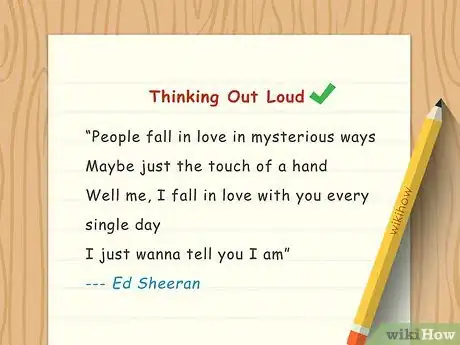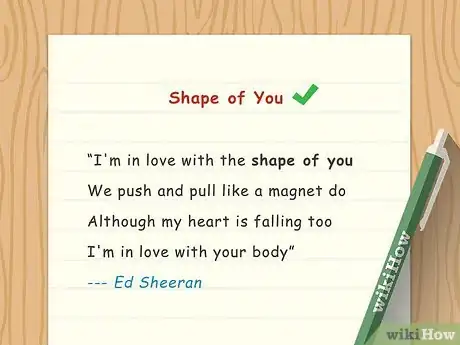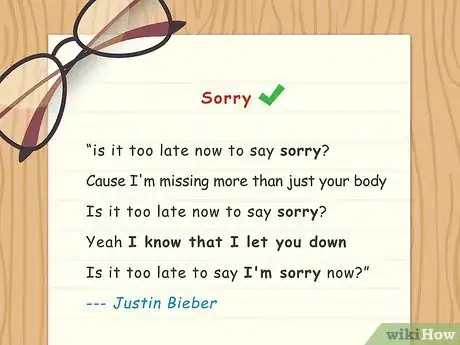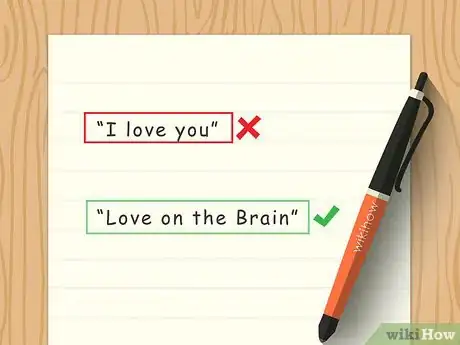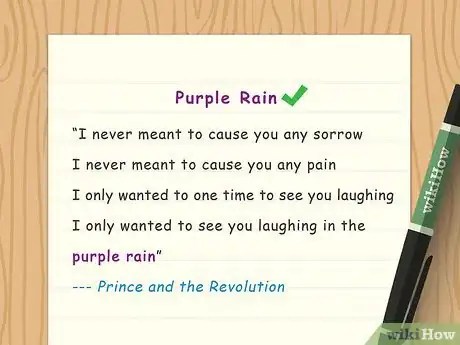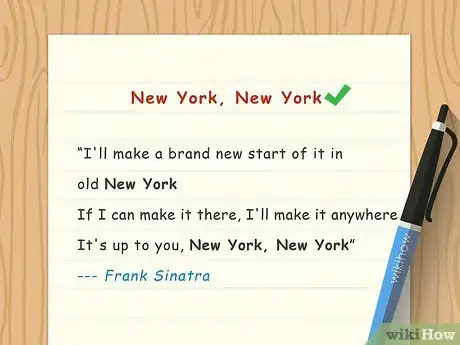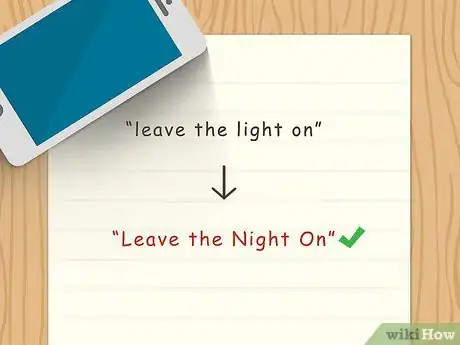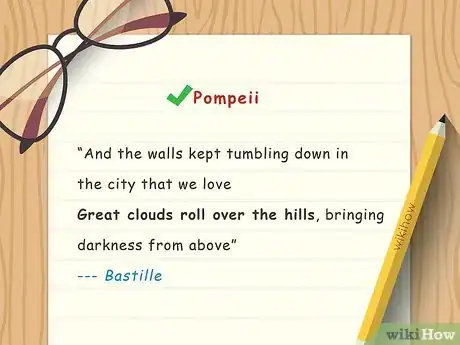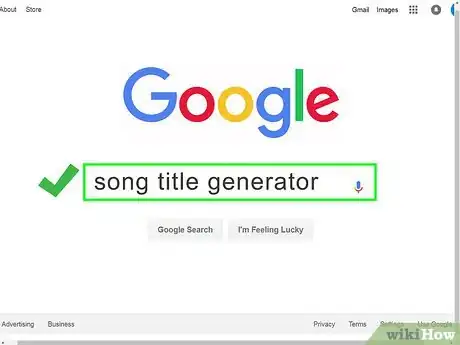This article was co-authored by wikiHow Staff. Our trained team of editors and researchers validate articles for accuracy and comprehensiveness. wikiHow's Content Management Team carefully monitors the work from our editorial staff to ensure that each article is backed by trusted research and meets our high quality standards.
This article has been viewed 39,871 times.
Learn more...
You’ve just written an awesome song, and now you’re searching for the perfect title to match it! Some artists get stuck at this point, but naming a song can be fun and easy once you get your creativity flowing. Most songwriters use the song or their environment as inspiration to come up with effective titles that tell the listener what they can expect from the song in a unique way.
Steps
Drawing Inspiration from the Song
-
1Write a 2-3 word summary of your song. Write about the emotions in the song, the story that it tells, or how you felt when you were writing. Breaking it down into short phrases will help you to understand what your listener will think the song is about.[1]
- It’s okay to have a summary that is longer than 2-3 words. Many popular artists have longer titles for their songs.
- Songs like “Thinking Out Loud” and “Lights Down Low” are great examples of short phrases that summarize the emotion or story of a song.
-
2Take a line from the chorus, bridge, or hook. It might be the case that your title is already hidden somewhere within the lyrics you’ve written. Search for a line or part of a line that really sums up the emotion behind the song, or a line that is repeated often throughout the song.[2]
- Songwriters sometimes use repeated lines as the title because they can help the listener avoid the age-old problem of knowing the lyrics but not remembering the title of the song.
- For example, “Shape of You” is taken directly from the lyrics of the song in the chorus.
Advertisement -
3Name the song after your emotions. If your song is expressing one specific emotion that lasts through the whole song, you can name it after that emotion. You can be as simple or broad as you’d like with your wording, or you can be very specific with an exact emotion.
- A great example of this is “Happy,” which encompasses the entire attitude of the song!
- "Sorry" is another good example of this method.
-
4Come up with a unique way to say a cliche phrase. Your song might be expressing an emotion like “I love you” or “I miss you” but these titles are often overused. To avoid this problem, you might brainstorm how you can express those feelings other than saying that phrase.[3]
- "Love on the Brain" references love and the emotion without specifically saying “I love you” in the title.
-
5Choose a color that represents the song. Colors and emotion are closely related, and most people associate specific emotions with a color. Close your eyes and think about what you’ve written and what color comes to mind. Use that color and a noun or verb to name the song.[4]
- Some great examples of this are “Purple Rain,” or “The Lady in Red.”
Using Outside Inspiration
-
1Name the song after the time or place it was written. Your environment can be a huge source of inspiration. If you wrote the song on a Saturday afternoon, or became inspired on a trip to Paris, you can use the environmental as part of your title.[5]
- "New York New York" is a famous song that uses this method.
-
2Modify an idiomatic expression or pun. A lot of songwriters use wordplay in their titles to make them unique. In this case, the title doesn’t necessarily have to be about summarizing the song, but more about making a joke or clever remark based on one part of the song.[6]
- For example, “Leave the Night On” is a play on the phrase “leave the light on.”
-
3Pull lines from books, movies, or even history. If you have a favorite movie or novel that inspired you when you were writing, you can use a short phrase from the story to name your song. A lot of songwriters also use names of historical figures or events as titles, regardless of what the song is about.[7]
- For example “Paul Revere” by the Beastie Boys doesn’t really have anything to do with the historical figure other than its name.
- On the other hand, the song “Pompeii” by Bastille is about the volcanic explosion at Pompeii.
-
4Try using an online song title generator. There are plenty of websites online that can come up with a title based on a word or a few words that you input. Even if it doesn’t give you a name, it can still give you some ideas based on its suggestions.
- If you can't find any, try googling "song title generator."
Community Q&A
-
QuestionWhat do you do if the song doesn't have words?
 ArcherArcade WizardCommunity AnswerWhen there are no lyrics to determine the title, you must come up with a name that makes sense. A few strategies are: Pick a title that relates to the kind of sound of the song (ex."Water Level" if it sounds like a video game water level). Pick a title that sets the mood of the song (ex. "Tears" for a sad song). And lastly, if you are writing a song, you can come up with an inspiring title (ex. "Sky Palace" could inspire you to imagine you are in a sky palace for the song).
ArcherArcade WizardCommunity AnswerWhen there are no lyrics to determine the title, you must come up with a name that makes sense. A few strategies are: Pick a title that relates to the kind of sound of the song (ex."Water Level" if it sounds like a video game water level). Pick a title that sets the mood of the song (ex. "Tears" for a sad song). And lastly, if you are writing a song, you can come up with an inspiring title (ex. "Sky Palace" could inspire you to imagine you are in a sky palace for the song).
Warnings
- Although song titles aren’t copyrightable, try to come up with your own original title to avoid any confusion.⧼thumbs_response⧽
References
- ↑ http://canuwrite.com/article_titles_poems.php
- ↑ http://vincecorozine.com/media/pdf/How%20To%20Write%20a%20Catchy%20Song%20Title.pdf
- ↑ http://canuwrite.com/article_titles_poems.php
- ↑ http://vincecorozine.com/media/pdf/How%20To%20Write%20a%20Catchy%20Song%20Title.pdf
- ↑ http://vincecorozine.com/media/pdf/How%20To%20Write%20a%20Catchy%20Song%20Title.pdf
- ↑ http://vincecorozine.com/media/pdf/How%20To%20Write%20a%20Catchy%20Song%20Title.pdf
- ↑ https://genius.com/Genius-lists-songs-based-on-historical-events-annotated
